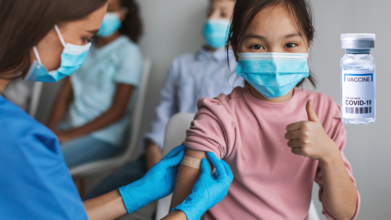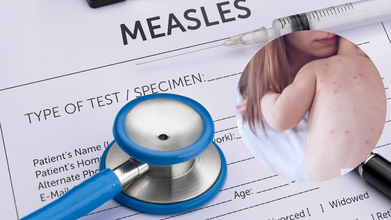- Health Conditions A-Z
- Health & Wellness
- Nutrition
- Fitness
- Health News
- Ayurveda
- Videos
- Medicine A-Z
- Parenting
- Web Stories
Young Kids Should Get Covid-19 Vaccine: US Pediatric Group Breaks Away From CDC Guidelines

Credits: Canva
August 19 marked a sharp split in U.S. vaccine policy after the American Academy of Pediatrics (AAP) released updated immunization guidelines that call for COVID-19 vaccination in young children. The move breaks from recent federal guidance shaped by Health and Human Services Secretary Robert F. Kennedy Jr.
Why the AAP is Standing Apart
The AAP, which represents more than 65,000 board-certified pediatricians, has long been a central authority on children’s health. In June, the organization had already signaled its concern, saying the federal process for creating vaccine schedules was “no longer credible” after Kennedy dismissed the 17-member Advisory Committee on Immunization Practices. That panel traditionally guides the CDC’s vaccine recommendations.
Kennedy replaced the group with appointees that many in the medical community consider unqualified, several with ties to anti-vaccine organizations. The May announcement that COVID-19 vaccines would no longer be on the CDC’s recommended list for healthy children and pregnant women further deepened tensions.
“The AAP will continue to provide recommendations that are rooted in science and in the best interest of children and families,” AAP President Dr. Susan J. Kressly said in a statement.
Also Read: CDC No Longer Recommends COVID Vaccine For Kids And Pregnant Women - What Do Experts Think?
What the AAP Recommends for Kids
The updated AAP schedule covers vaccines from birth through age 18, including influenza, RSV, and COVID-19. The pediatric group recommends:
Ages 6 months to 23 months: All children should receive the updated COVID-19 vaccine to lower the risk of severe illness.
Ages 2 to 18: Children and adolescents without other high-risk conditions should be offered the vaccine if not already immunized.
High-risk children and adults: Those with conditions like weakened immune systems should receive the vaccine regardless of age.
The organization stressed that its guidance is based on peer-reviewed evidence, countering federal messaging that leaves vaccination decisions to parental consultation with physicians.
Federal Guidance Under Kennedy
The CDC has not completely eliminated COVID-19 vaccination from its schedule but shifted language in August to a softer stance. Instead of recommending annual doses for children, the agency now advises parents to “consult with their child’s physician” to decide.
Kennedy has said publicly that the vaccine should be reserved for people over 65 or those at high risk. The CDC website still lists recommendations for everyone over six months, but with a notice that the information is being updated to reflect new schedules.
Experts have warned this change may create barriers to access, since insurance coverage often mirrors CDC recommendations. Families who want their children vaccinated but do not fall under the new federal priority categories could be forced to pay out of pocket.
Read More: FDA Approves New Covid Vaccine For Kids With Selective Eligibility
The Growing Clash Between AAP and HHS
The disagreement has sparked sharp exchanges between pediatric leaders and the federal government. HHS Communications Director Andrew Nixon accused the AAP of advancing commercial interests, citing pharmaceutical funding ties.
“By bypassing the CDC’s advisory process and issuing its own recommendations, the AAP is putting politics above children’s health,” Nixon said in a statement.
Kennedy echoed those concerns on social media, calling the pediatric guidance “corporate-friendly” and suggesting it primarily benefits vaccine manufacturers. He also warned that diverging from federal recommendations could leave doctors legally vulnerable, since liability protections under the Vaccine Injury Act apply only to CDC-approved schedules.
AAP President Dr. Kressly rejected those claims. “This attack on the integrity of pediatricians is unfortunate, but it does not change the facts. Our immunization recommendations are rooted in decades of peer-reviewed science,” she said.
What Comes Next
The newly appointed federal Advisory Committee on Immunization Practices has not yet voted on COVID-19 guidance and is expected to meet again in early fall. Meanwhile, the FDA is weighing whether to revoke authorization of the Pfizer COVID-19 vaccine for healthy children.
The split leaves parents facing a confusing landscape. While federal authorities have scaled back recommendations, pediatricians say the science still supports protecting children with the COVID-19 shot. As the AAP put it, the mission is clear: to keep kids, families, and communities healthy, regardless of shifting political winds.
Measles Outbreak: Cases Surge In South Carolina; After US, Canada's Elimination Status Too Could Be Threatened

Credits: Canva
Measles Outbreak: Measles is back again in America, with the Upstate South Carolina being hit by the outbreak again, and grown by 2 more cases. This has raised the state total to 25.
Health officials have confirmed that both the new infections were linked to close contacts of known cases. Those two in contact were under quarantine at home following exposures at two schools that had a high percentage of unvaccinated students. Of the state's 25 cases, 22 have occurred as part of the Upstate outbreak.
New York’s Rockland County has confirmed its second measles case in three months. The county, which saw a major measles outbreak in 2018–19 and has a sizable unvaccinated population, is once again on alert. Health officials said the new case is unrelated to the one reported in August, with the patient developing a rash soon after returning from an overseas trip last week.
Canada's Elimination Status Could Be Threatened By Measles Cases
October 28 marked one year of continuous measles transmission in Canada. This is a cycle of virus activity that is now threatening the country's elimination status.
As of now, the country has had more than 5,100 cases. This has been noted since the fall of 2024. This is more than double the number recorded in the past 25 years combined, which is why it is a cause of concern.
Canada had eliminated measles in past. In 1998, the disease was eliminated, however, with the new situation, the status of the country now seems to be in jeopardy. This is also because the elimination status requires an absence of the local virus transmission for at least 12 months.
According to CNN, the Pan American Health Organization (PAHO) is set to review and assess the measles elimination status of several North American countries during its annual meeting next month. In Canada, nearly 90% of the measles cases reported over the past year have occurred among unvaccinated individuals. Moreover, all but 157 of these cases have been linked to the ongoing outbreak that began in Ontario in October 2024.
In Israel too, as confirmed by The Jerusalem Post, eight child has died due to measles outbreak in the nation. The recent death is of a child, who was just 2-year-old. In Israel, all deaths in this outbreak have been noted in unvaccinated children under age 3 years.
Could US Too Lose Its Eliminated Status?
Measles has held “eliminated” status in the United States since 2000, a designation that means there had been no year-long, uncontrolled spread of the virus within the country for decades. But that milestone is now in jeopardy.
The infection is spreading again, and the Centers for Disease Control and Prevention (CDC) has reported 1,596 confirmed cases this year, the highest annual total in over thirty years. The actual number could be higher, says Dr. Paul Offit, director of the Vaccine Education Center at the Children’s Hospital of Philadelphia.
Why Are Cases Increasing In The US?
In Mohave County, Arizona, vaccination coverage among kindergartners dropped from 91% in 2019–20 to 78% in 2024–25, with a similar decline noted in southwest Utah.
Public health experts stress that at least 95% vaccination coverage is necessary to prevent the virus from spreading. Both Utah and Arizona allow parents to exempt children from school vaccine mandates on personal or religious grounds, leaving pockets of unprotected populations. Vaccine hesitancy has deepened since the Covid-19 pandemic, fueled by political polarization and a decline in public trust toward health authorities. Notably, most of the affected towns voted heavily for Donald Trump in the 2024 election, underscoring how politics and misinformation continue to shape vaccination decisions.
New Mpox Strain Detected in California Sparks Health Alert

Credits: Canva
More than two years after the mpox outbreak in the United States was officially declared over, a fresh cluster of cases in California has caught the attention of infectious disease experts.
The previous U.S. outbreak, which spread primarily among men who have sex with men, was declared over in early 2023, though sporadic cases have continued to appear. Now, health officials are worried after identifying three unrelated mpox cases in California linked to a more infectious and potentially more severe strain of the virus known as clade I mpox.
What Is Mpox?
Mpox, previously called monkeypox, is a viral infection caused by the monkeypox virus, a member of the Orthopoxvirus genus. According to the World Health Organization, the virus is divided into two main groups—clade I (which includes Ia and Ib) and clade II (which includes IIa and IIb). The 2022–2023 global outbreak was linked to the clade IIb strain. The disease continues to pose a global health concern, with a sharp rise in cases reported in the Democratic Republic of the Congo and other regions due to clades Ia and Ib, and now in the United States.
How This Strain Differs From the 2022 Outbreak
The mpox variant responsible for the 2022 outbreak belonged to clade II, a strain with a relatively low fatality rate. During that outbreak, over 32,000 infections were reported nationwide, resulting in 58 confirmed deaths—a mortality rate of about 0.2 percent.
Clade I mpox, by comparison, has been found to cause more serious illness and spread more easily. Both strains exist in parts of Central Africa, but clade I has historically shown higher transmissibility and mortality than clade II.
California Cases Raise Alarm Over Possible Community Spread
All three of the California patients infected with the clade I strain required hospitalization. According to the California Department of Public Health (CDPH), the pattern of infection suggests that, much like the 2022 outbreak, transmission is again occurring primarily within networks of men who have sex with men.
Dr. Joseph Cherabie, assistant professor of infectious diseases at Washington University in St. Louis and a board member of the HIV Medicine Association, said it was “only a matter of time” before clade I reached the U.S.
While a previous California case of clade I mpox was linked to travel in Africa, these recent infections have no known travel connections, a detail that worries experts. “That makes us a little bit uncomfortable as epidemiologists and as public health folks,” Cherabie said, adding that it signals local transmission that health authorities may not yet be fully detecting.
Transmission and Concerns About Undetected Cases
Mpox spreads mainly through direct skin-to-skin contact with someone who is infected, often through the painful rashes characteristic of the disease. Since the source of infection for these cases remains unclear, Cherabie believes there are likely more undetected cases circulating in the community.
When mpox first appeared in nonendemic countries in 2022, health agencies faced the challenge of having no treatments or vaccines made specifically for it. However, existing smallpox treatments were found to be effective against mpox, given their viral similarities.
Treatment and Vaccine Options
The smallpox vaccine Jynneos and the antiviral drug tecovirimat (Tpoxx) continue to be the leading tools for protection and treatment. Experts expect them to work against both clade I and clade II mpox.Jynneos requires two doses for complete protection, while Tpoxx can be given either intravenously or orally, depending on the severity of symptoms.
Texas Sues Tylenol Makers After Trump Links Painkiller To Autism — All You Need to Know

Credits: Canva
Texas sues tylenol: Texas Attorney General Ken Paxton announced on October 28 that he has filed a lawsuit against the makers of Tylenol, accusing them of failing to warn consumers about possible risks of using the drug during pregnancy. According to USA Today, the lawsuit targets Johnson & Johnson and its spin-off company Kenvue, alleging they concealed information about Tylenol’s potential links to autism and attention deficit hyperactivity disorder (ADHD), violating state consumer protection laws.
“These corporations lied for decades, knowingly endangering millions to fill their own pockets,” Paxton said in a statement. “When they saw accountability coming, Johnson & Johnson tried to dodge responsibility by offloading their liability to another company. By holding Big Pharma accountable for poisoning our people, we will help Make America Healthy Again.”
This marks the first lawsuit by a state government since President Donald Trump recently claimed that using Tylenol during pregnancy may raise the risk of autism — a claim that has limited scientific support.
Tylenol: Why Is Texas Suing Tylenol Makers?
Texas’s lawsuit, the first of its kind from any state, follows remarks made last month by President Trump and Health and Human Services Secretary Robert F. Kennedy Jr., who jointly issued new guidance discouraging pregnant women from using acetaminophen, the active ingredient in Tylenol. They cited it as a possible factor behind autism, sparking widespread concern and confusion among expecting mothers and healthcare experts alike.
The research surrounding Tylenol’s use in pregnancy remains unsettled. While a few studies have suggested a possible link between prenatal exposure and autism, many others have found no such connection. Major medical organizations have since pushed back against Trump and Kennedy’s statements, warning that the claims could spread unnecessary fear and misinformation.
This lawsuit is the first to formally adopt Trump’s theory that acetaminophen use in pregnancy might cause developmental disorders in children. The issue has long circulated among Kennedy’s followers, but Trump’s public comments brought it into mainstream discussion.
Texas Sues Tylenol: Tylenol Maker Fights Autism Warning Label
Kenvue has strongly defended Tylenol’s safety and dismissed Trump’s allegations, calling them misleading. Johnson & Johnson has also maintained that it has always acted responsibly in its product labeling, warning users only about the proven risk of liver damage from overuse.
In an official response, Kenvue stated that it was “deeply concerned by the spread of misinformation about the safety of acetaminophen and how it may affect women and children.” The company emphasized that acetaminophen remains “the safest pain relief option for pregnant women when needed throughout pregnancy.” Without it, they argued, women could face dangerous choices, either enduring untreated pain and fever, which may harm both mother and baby, or turning to more hazardous alternatives.
Over the past few years, hundreds of lawsuits have been filed nationwide by parents who believe their children developed autism or ADHD after prenatal Tylenol exposure. The largest group of such cases, consolidated in federal court in New York, was dismissed earlier this year due to insufficient scientific evidence. Plaintiffs have appealed the ruling, with an appellate hearing scheduled for November 17.
Texas Sues Tylenol: Is Acetaminophen Linked to Neurodevelopmental Disorders?
According to The New York Times, scientists have explored possible links between acetaminophen use during pregnancy and developmental disorders for years, but the research remains inconclusive.
Medical associations have rejected the Trump administration’s recent warning, reiterating that Tylenol is still considered the safest pain reliever for pregnant women. They warn that avoiding it altogether could be dangerous, as untreated high fevers and severe pain can pose serious health risks to both the mother and the unborn child.
© 2024 Bennett, Coleman & Company Limited

